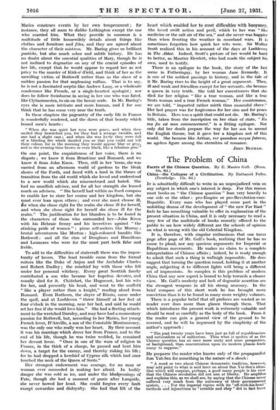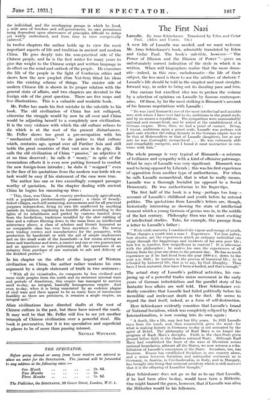The Problem of China
Facets of the Chinese Question. By E. Menke Gull. (Bann.
10s. 6d.) _ . China—the Collapse of a Civilization. By Nathaniel Puffer. (Routledge. 12s. 6d.)
. . -
IT is admittedly difficult to write in an unprejudiced vein, on
any subject in which one's interest is deep. For this reason most books on " the Chinese question " lean very heavily to one side or the other : pro-Empire or pro-Revolution-cum- Republic. Every man who has played some part in the unfolding drama of the development of " the new Far East" feels he has something valuable to offer in explanation of the present situation in China, and it is only necessary to read a very few of the multitude of books recently offered to the public to see how widely different are the schools of opinion on what is wrong with the old Celestial Kingdom.
It is, therefore, with singular enthusiasm that one.turns page after page of Mr. Gull's book, realizing that he has no cause to plead, nor any specious arguments for Imperial or Republican movements. He makes no claim to a complete interpretation of Chinese affairs ; indeed, he is ready enough to admit that such a thing is wellnigh impossible. He does suggest that turning the question round, holding it at another angle, subjecting it to different lights will bring a different set of impressions. So complex is this problem of modern China that any new aspect is bound to help towards a clearer view. Mr. Gull's modesty and lack of dogmatic assertion are the strongest weapOns in all his strong armoury. In the brief compass of this short work he has brought more conviction than is to be found in many more weighty volumes.
There is a popular belief that all prefaces are wasted as no reader ever does more than glance through them. That which introduces the present work is extremely valuable and should be read as carefully as the body of the book. From it the reader can gain a general view of the ground to be covered, and he will be impressed by the simplicity of the author's approach :
"The past twenty years have been just as full of republicanism and nationalism as of militarism. Thus what is spoken of as the Chinese question has at once more unity and more perspective, or background, than concentration upon its modern phases leads many to suppose."
He prepares the reader who knows only of the propagandist Sun Yat-Sen for something in the nature of a shock : " A word or two about Chinese democratic tradition, however, may add point to what is said later on about Sun Yat-Sen's ideas. One which will surprise, perhaps, a good many people is his view that the Chinese revolution did not aim at liberty. He amplifies and explains this, as we shall see, by saying that the Chinese never suffered very much from the autocracy of their governmental system.. . . For the imperial regime with its ' off-with-his-head ' methods and injunctions to `tremble and obey' did in fact leave
the individual, and the overlapping groups in which he lived,
a wide area of freedom and self-government, its own persistence being dependent, upon observance of principles difficult to define yet widely understood, and from time to time energetically enforced.'
In twelve chapters the author holds up to view the most important aspects of life and tradition in ancient and modern China. He goes deeply into the non-practical side of the Chinese people, and he is the first writer for many years to give due weight to the Chinese script and written language in its effect on the mind and outlook of the people. He examines the life of the people in the light of Confucian ethics and shows how the new prophet (Sun Yat-Sen) fitted his ideas into the existing scheme of things. The sinister side of modem Chinese life is shown in its proper relation with the general state of affairs, and two chapters are devoted to the foreign side of the great question. There are five maps and five illustrations. This is a valuable and readable book.
Mr. Peffer has made his first mistake in the sub-title to his book. The old civilization of China has not collapsed, otherwise the struggle would by now be all over and China would be adjusting herself to a completely new civilization. It is the very violence with which the old culture refuses to die which is at the root of the present disturbances. Mr. Peffer shows too great a pre-occupation with his " mechanized civilization " to do justice to that culture which, centuries ago, spread over all Further Asia and still holds the great countries of that vast area in its grip. He calls the old civilization of China " passive," an adjective it at no time deserved ; he calls it " weary," in spite of the tremendous efforts it is even now putting forward to combat the new foreign-born intruder ; he dubs it " resigned " even in the face of his quotations from the modern war-lords whose task would be easy if his statement of the case were true.
The author has one or two exceedingly compact passages worthy of quotation. In the chapter dealing with ancient China he begins his summing-up thus :
" This, then, was China. A country predominantly agricultural, with a population predominantly peasant ; a chain of loosely- linked villages, each self-sustaining, autonomous and for all practical purposes independent, living its own life unaffected by anything outside its horizon, regulating its humble affairs according to the lights of its inhabitants and guided by customs handed down from the forefathers, traditions moulded by the slow rubbing of time and a culture filtering down to the mass from an intellectual aristocracy above, a class of scholars and literati honoured as no comparable class has ever been anywhere else. The towns were trading centres and manufactories for the peasantry, with production by handicraft or with the aid of simple implements and on the small scale of the household—a few rooms serving as home and warehouse and store, a master and one or two journeymen and an apprentice or two performing all the operations of an industry from purchase of raw materials to sale and delivery of the finished product."
In his chapter on the effect of the impact of Western civilization on China, the author rather weakens his own argument by a simple statement of truth in two sentences :
" With all its vicissitudes, its conquests by less civilized and more virile peoples from the north and its recurrent internal wars and periods of dissolution, this empire has managed to survive until to-day, an integral, basically homogeneous empire. And even to-day, when it is being emaciated by an endemic plague of civil wars and there appear to be as many lines of internecine hostility as there are provinces, it remains a single empire, an integral unit."
Alien civilizations have directed shafts at the root of Chinese culture in the past, but these have missed the mark. It may well be that Mr. Peffer will live to see yet another triumph of Chinese civilization over a powerful rival. His book is provocative, but it is too speculative and superficial in places to be of more than passing interest.
NEVILLE WIIYMANT.







































 Previous page
Previous page